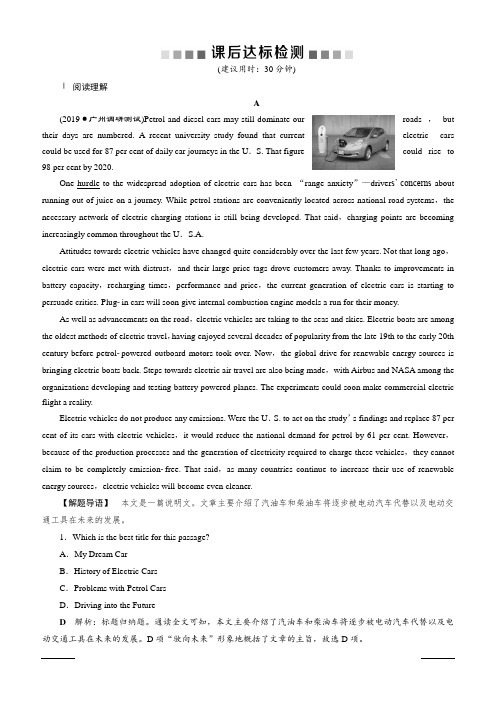高考调研新课标英语必修四1-4高考调研精讲精练
- 格式:ppt
- 大小:2.03 MB
- 文档页数:17


(建议用时:30分钟)Ⅰ阅读理解A(2019·广州调研测试)Petrol and diesel cars may still dominate our roads,buttheir days are numbered. A recent university study found that current electric cars could be used for 87 per cent of daily car journeys in the U.S. That figure could rise to 98 per cent by 2020.One hurdle to the widespread adoption of electric cars has been “range anxiety”—driver s’ concerns about running out of juice on a journey. While petrol stations are conveniently located across national road systems,the necessary network of electric charging stations is still being developed. That said,charging points are becoming increasingly common throughout the U.S.A.Attitudes towards electric vehicles have changed quite considerably over the last few years. Not that long ago,electric cars were met with distrust,and their large price tags drove customers away. Thanks to improvements in battery capacity,recharging times,performance and price,the current generation of electric cars is starting to persuade critics. Plugin cars will soon give internal combustion engine models a run for their money.As well as advancements on the road,electric vehicles are taking to the seas and skies. Electric boats are among the oldest methods of electric travel,having enjoyed several decades of popularity from the late 19th to the early 20th century before petrolpowered outboard motors took over. Now,the global drive for renewable energy sources is bringing electric boats back. Steps towards electric air travel are also being made,with Airbus and NASA among the organizations developing and testing battery powered planes. The experiments could soon make commercial electric flight a reality.Electric vehicles do not produce any emissions. Were the U.S. to act on the study’s findings and replace 87 per cent of its cars with electric vehicles,it would reduce the national demand for petrol by 61 per cent. However,because of the production processes and the generation of electricity required to charge these vehicles,they cannot claim to be completely emissionfree. That said,as many countries continue to increase their use of renewable energy sources,electric vehicles will become even cleaner.【解题导语】本文是一篇说明文。




高考调研新课标英语必修四单元卷5高考调研精讲精练单元质量检测卷(五)[时间:120分钟满分:150分] 第一部分听力(省略)第二部分阅读理解第一节(共15小题;每小题2分,满分30分)阅读下列短文,从每题所给的四个选项(A、B、C和D)中选出最佳选项。
Next time you’re in a public place, take a look around you, and count how many people are using their phones. I can tell you now that it is probably more than half, whether you’re on public transport, in a caféor simply walking down the street.I’m not saying that I am not an example of this, but it alw ays amazes me how people can spend so much time on their phones without actually talking to anyone in particular.For example, I recently visited London and travelled on the tube while I was there. Apart from the people asleep, almost everybody elsewas on their phones, and because of the nature of the tube, it is difficult not to see exactly what they are all doing. Of course, being underground it is difficult to get any signal, which rules out texting or using the Internet, but there is still plenty you can use your phones for. People were playing games, reading articles and listening to music, and I am sure that as soon as they emerged from the train station they would start texting or calling or checking their emails.Recently, my smart phone broke and had to be sent off to the warehouse for repair for a week or so. In the meantime I had to use a really old, basic phone just to keep me in touch with my family and friends. All I could do on this phone was send textmessages, make calls and play one game. And I loved it. I loved being free from the Internet, and I really didn’t mind not having constant updates about what my friends were doing or what the latest celebrity story was. It allowed me to spend more time taking in my surroundings.However, I knew that as soon as I got my smart phone back I would be one of those_people once again. Perhaps I should just go back to using the basic phone and forget my smart phone.21. Why are you asked to look around in Paragraph 1?A. To ensure your safety.B. To communicate with people.C. To see what people are doing.D. To count the people around you.22. What were many people on the tube in London probably doing?A. Using mobile apps.B. Talking to each other.C. Reading printed books.D. Checking social network sites.23. What did the author think of having to use his basic phone?A. He felt great actually.B. He found it very inconvenient.C. He couldn’t see much difference.D. He felt terrible at first but better later.24. What does the underlined part “those people”in the last paragraph refer to?A. People without mobiles.B. People using basic phones.C. People using smart phones reasonably.D. People spending a lot of time on mobiles.答案与解析【文章大意】本文是夹叙夹议文。
单元质量检测卷(五)[时间:120分钟满分:150分] 第一部分听力(省略)第二部分阅读理解第一节(共15小题;每小题2分,满分30分)阅读下列短文,从每题所给的四个选项(A、B、C和D)中选出最佳选项。
Next time you’re in a public place, take a look around you, and count how many people are using their phones. I can tell you now that it is probably more than half, whether you’re on public transport, in a caféor simply walking down the street.I’m not saying that I am not an example of this, but it always amazes me how people can spend so much time on their phones without actually talking to anyone in particular.For example, I recently visited London and travelled on the tube while I was there. Apart from the people asleep, almost everybody elsewas on their phones, and because of the nature of the tube, it is difficult not to see exactly what they are all doing. Of course, being underground it is difficult to get any signal, which rules out texting or using the Internet, but there is still plenty you can use your phones for. People were playing games, reading articles and listening to music, and I am sure that as soon as they emerged from the train station they would start texting or calling or checking their emails.Recently, my smart phone broke and had to be sent off to the warehouse for repair for a week or so. In the meantime I had to use a really old, basic phone just to keep me in touch with my family and friends. All I could do on this phone was send text messages, make calls and play one game. And I loved it. I loved being free from the Internet, and I really didn’t mind not having constant updates about what my friends were doing or what the latest celebrity story was. It allowed me to spend more time taking in my surroundings.However, I knew that as soon as I got my smart phone back I would be one of those_people once again. Perhaps I should just go back to using the basic phone and forget my smart phone.21. Why are you asked to look around in Paragraph 1?A. To ensure your safety.B. To communicate with people.C. To see what people are doing.D. To count the people around you.22. What were many people on the tube in London probably doing?A. Using mobile apps.B. Talking to each other.C. Reading printed books.D. Checking social network sites.23. What did the author think of having to use his basic phone?A. He felt great actually.B. He found it very inconvenient.C. He couldn’t see much difference.D. He felt terrible at first but better later.24. What does the underlined part “those people”in the last paragraph refer to?A. People without mobiles.B. People using basic phones.C. People using smart phones reasonably.D. People spending a lot of time on mobiles.答案与解析【文章大意】本文是夹叙夹议文。